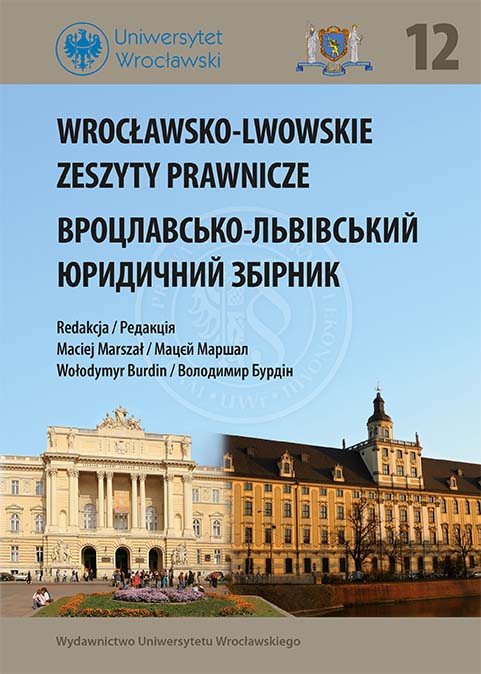

Artykuły

Procedura konkursowa w służbie cywilnej na Ukrainie: wprowadzenie doświadczeń europejskich
Artykuł ten jest kompleksowym opracowaniem procedury konkursowej w służbie cywilnej na Ukrainie. Na podstawie systematycznej, strukturalnej, prawnej i porównywalnej analizy ustawodawstwa krajowego i ustawodawstwa państw Unii Europejskiej zrealizowano uzasadnienie ogólnych przepisów teoretycznych, w szczególności definicji pojęcia, zasad i struktury procedury konkursowej w służbie cywilnej oraz sformułowano propozycje udoskonalenia ukraińskiego ustawodawstwa.
Doświadczenie państw członkowskich Unii Europejskiej udowadnia, że konkurs jest efektywnym sposobem formowania politycznie bezstronnej i profesjonalnej służby cywilnej. Procedura konkursowa jest sposobem wyznaczenia najlepiej przygotowanego kandydata na wakujące stanowisko w służbie cywilnej. Głównymi zasadami procedury konkursowej są: legalność, otwartość, równe traktowanie, konkurencja kompetencyjna. Opisano organizacyjno-prawne sposoby zajmowania stanowisk w organach wykonawczych w służbie cywilnej. Ustawodawstwo ukraińskie określa główne etapy konkursu: ogłoszenie konkursu na służbę cywilną i publikację informacji na Jednolitym portalu wolnych stanowisk w służbie cywilnej, przeprowadzenie testów, rozwiązywanie zadań sytuacyjnych (dla grupy stanowisk „A” i „B”), rozmowy kwalifikacyjne; ustalenie wyników konkursu i wyznaczenie zwycięzcy, który otrzymał najwyższą ocenę ogólną.
Na Ukrainie na potrzeby konkursu tworzone są dwa rodzaje komisji konkursowych – komisja konkursowa starszej służby cywilnej (dla stanowisk kategorii „A”) oraz komisje konkursowe (dla stanowisk innych kategorii). Decyzje takich komisji są obowiązujące dla podmiotu powołującego. Od decyzji komisji konkursowej można odwołać się tylko do sądu administracyjnego.
W 2020 r. wystąpiła pandemia spowodowana zakażeniem koronawirusem SARS COV-2. W marcu ubiegłego roku rząd Ukrainy wprowadził ograniczenia, które spowodowały zawieszenie konkursu na służbę cywilną. Doprowadziło to do publicznej debaty. W marcu 2021 r. wprowadzono zmiany w ukraińskim ustawodawstwie dotyczącym służby cywilnej, które pozwoliły na prowadzenie oddzielnych etapów konkursu z wykorzystaniem komunikacji wideo. W związku z tym należy dodatkowo decydować w kwestiach zapewnienia obiektywności konkursu w trybie komunikacji wideo, a także udziału przedstawicieli organizacji obywatelskich i ekspertów w pracach komisji konkursowych.
Studium doświadczeń europejskich, w szczególności Polski, Łotwy, Litwy, Estonii i innych krajów, przyczynia się do ciągłego udoskonalenia krajowego uregulowania procedury prawnej w służbie cywilnej oraz zapewnienia otwartości konkursu.
Competitive procedure in the civil service in Ukraine: implementation of European experience
This article is a complex research of the competitive procedure of civil service of Ukraine. This research contains a chain of theoretical principles and recommendations enunciated as a result of the comparative legal analysis of the legislation of Ukraine and the legislation of the European Union holding competition procedures. This article substantiated the determination of a definition, principles and structure of the competitive procedure of the civil service on the basis of the systematical structural and functional analysis effective legislation of Ukraine.
The experiences of European countries have proven that competition is an effective way to form a politically impartial and professional civil service. The competitive procedures are a way to determine the best candidate for a civil service position. The competitive procedure this qualification of business, personal, competence qualities of each candidate for civil service, which is regulated by administrative legislation, and competitive procedure makes it possible to identify the most professionally trained to fill a vacant civil service position. This procedure is characterized by: subjects, time limits, stages and principles. The basic principles of the competition procedure are: legality, openness and publicity, nondiscrimination, competition, equal treatment of candidates. Author described the organizational and legal basis of the competition as a way filling in positions of civil service in the executive branch.
The legislation of Ukrainian established the important stages of the competition: announcement of the civil service competition is placed on the Unified portal of civil service vacancies; testing, solving situational tasks in a written form (categories “A” and “B”, interviews, determining the results of the competition and compiling a rating of candidates, the final results of the competition and person who has won the competition; publication of the results of the competition on the Unified portal of civil service vacancies. The decision on the results of the competition may be appealed to the Administrative Court.
In Ukrainian was formed the competition two types of commissions – Competition Commission of the senior corps of the civil service (for positions of category “A”) and competition commissions for positions of other categories.
In 2020 humanity first encountered a pandemic caused by the coronavirus COVID-19. In March last year the Government of Ukraine introduced quarantine and competition procedures for the civil service was stopped. The suspension of the competition caused controversy in society. In a March of this year, Ukrainian legislation was amended. After the change of the legislation on the civil service, certain stages of the competition can be held remotely using video communication. It is necessary to improve national legislation order to ensure the objectivity of competition in video communication, as well as to ensure the participation of representatives of public organizations and experts in competitions commissions.
Research and analysis of the legislation of some European countries, Poland, Latvia, Lithuania, Estonia and other countries, contributes to the continuous improvement of national legal regulation of competition in the civil service and ensuring open competition